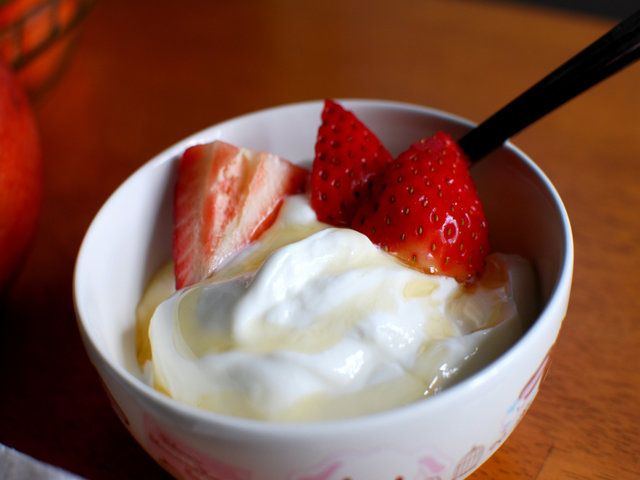
If you’re looking for a quick muscle building snack grab a Greek yogurt, as long as you know which type to pick.
Greek yogurt differs from conventional yogurt in that it’s strained to remove excess water, whey, and sugar making it protein packed and creamy. Greek yogurt has long been advertised as the ideal snack for just about everyone, from endurance athletes to bodybuilders and even the health conscious Yogi. After all, Greek yogurt has healthy fats, important minerals, moderate carbohydrates, and a variety of proteins that digest at different speeds. Most Greek yogurts have these basics in common but they come in different ratios. The yogurt you choose could be helping or hindering your goals of weight loss and building muscle. Here is how you can pick right and make your training count:
Check the Label
It’s crucial to understand which foods are good for us. It’s more important to understand why and the differences between the hundreds of varieties we have to choose from. With Greek yogurt the main difference is the amount of fat and carbohydrates each has since the protein is fairly equal. Let’s breakdown the three main options:
Plain Nonfat Fat Greek Yogurt:
- Quantity: 150 grams (1 container)
- Calories: 88
- Macronutrients:
- Protein: 15g
- Fats: 0g
- Carbohydrates: 7g (4g from sugar)
- Micronutrients:
- Calcium 15% of Daily Requirement*
- Vitamin B-12 13% of Daily Requirement*
Plain Nonfat Greek Yogurt has the most protein, no fat and only 7 grams of carbs. Since it has no fat it digests quickly but it loses micronutrient value. Calcium is fat soluble, meaning it can’t be properly absorbed without fat. If you’re looking to get the muscle contraction and bone building benefits from calcium you’ll have to add fat to the yogurt. Fats such as almond butter, nuts or seeds pair well. However if you’re going for a post-workout boost, add in processed carbs like honey or low fat granola.
Plain 2% Fat Greek Yogurt:
Quantity: 150 grams (1 container)
Calories: 134
Macronutrients:
- Protein: 13g
- Fats: 6g
- Carbohydrates: 7g (4g from sugar)
Micronutrients:
- Calcium: 15% of Daily Requirement*
- Vitamin 8-12: 13% of Daily Requirement*
The plain 2% fat Greek Yogurt is an equally good protein laden snack. The fat will help absorb the valuable nutrients as well as keep you satiated longer. At the same time since the fat slows down digestion it’s the least ideal of the Greek yogurts post-workout. You can keep it clean for fat loss or add in some extras like granola or trail mix if you’re looking to gain mass.
Nonfat Fruit on the Bottom Greek Yogurt (Strawberry)
Quantity: 150 grams (1 container)
Calories: 124
Macronutrients:
- Protein: 12
- Fats: 0g
- Carbohydrates: 19g (15g from sugar)
Micronutrients:
- Calcium: 15% of Daily Requirement*
- Vitamin 8-12: 13% of Daily Requirement*
Nonfat fruit on the bottom Greek yogurt is the sweet tooth of the bunch. The added sugar and minimal fat in this flavor makes it the most ideal post-workout snack. The extra sugar will spike insulin levels thus lowering the workout-induced cortisol. The extra sugar also floods your muscles with glucose and amino acids. If you’re really looking to pack on muscle you’ll need to consume a couple containers to get enough protein. Luckily it already has the ideal 1:2 protein to carbohydrate ratio for post-workout consumption so no extras are needed.
Make it Work for You
If you’re not in a rush take your snack to another level. Here are a couple simple and tasty options:
Breakfast Bowl
- 1.5 Cups Plain 2% Greek Yogurt
- 1/3 Cup frozen berries
- 1/3 Cup of granola
Post-Workout Power Smoothie
- 1 Cup plain nonfat Greek yogurt
- 1 Scoop vanilla whey
- 1/3 Cup blueberries
- 2 TBSP Honey
- ½ Cup ice
Frozen Greek Yogurt Ice Cream
Blend the following then freeze in a bowl:
- 1.5 Cups Plain 2% Greek Yogurt
- 1 Scoop casein protein
- 1 Banana
- Small handful of Coco Nibs
You train hard, now make sure to eat smart and make conscious decisions with your nutrition regimen. No matter what your goal Greek yogurt has a place in your fridge.
*Based on a 2,000 calorie diet
